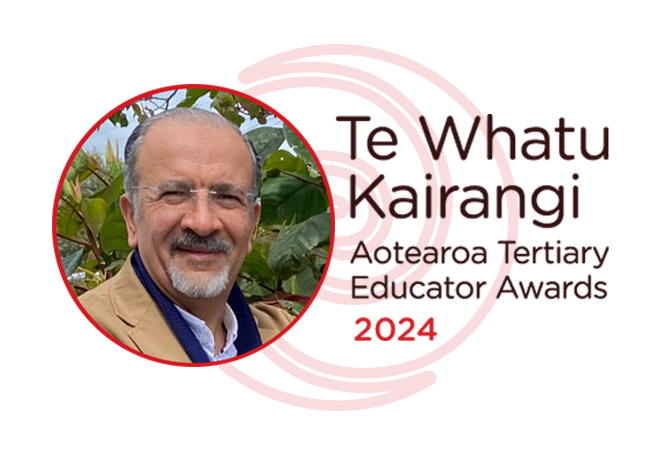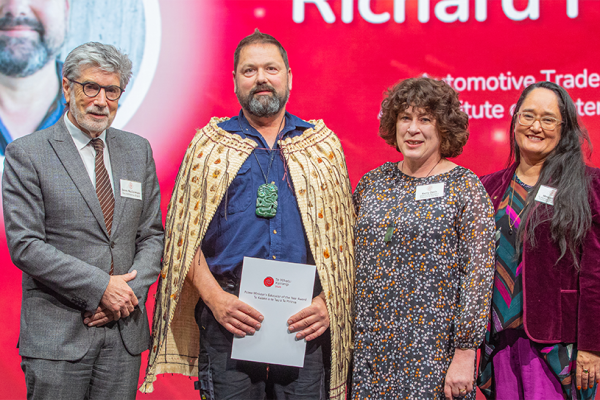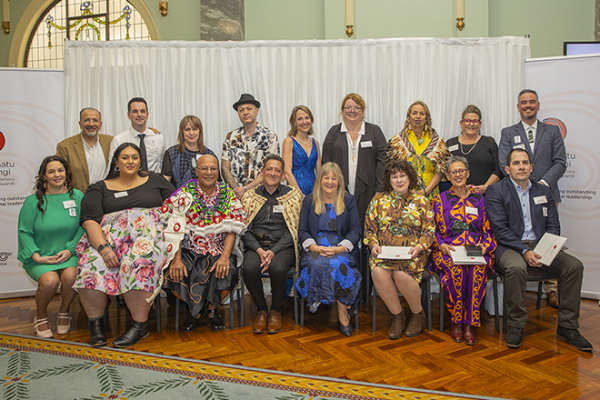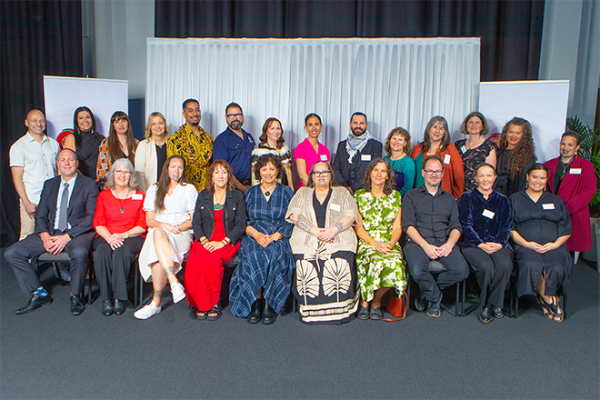Dr Joseph Aziz
Creating powerful learning experiences
General award winner: Innovation in learning, teaching, and curriculum
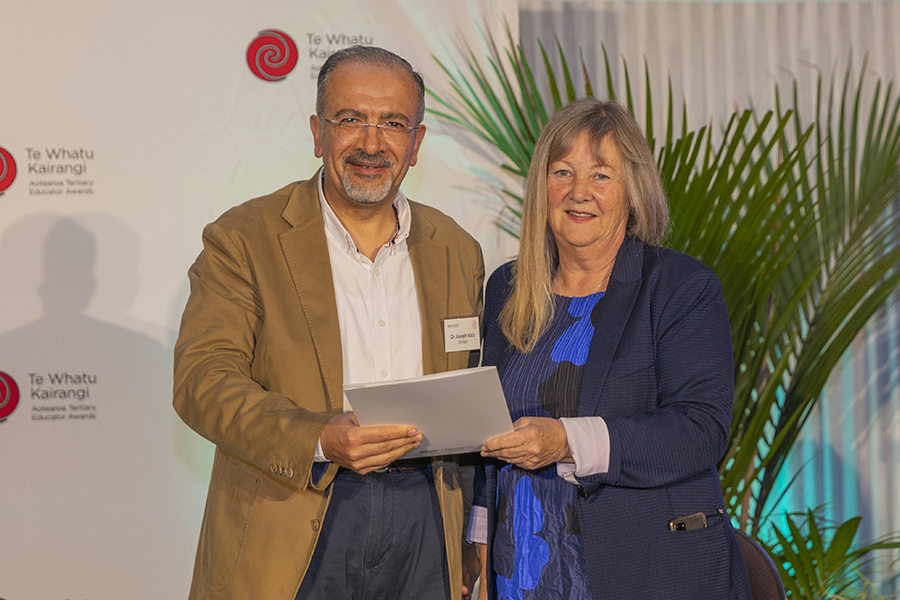
Senior Lecturer, Unitec Auckland
“Dr Aziz is energetic and resourceful, constantly finding ways to better engage his students and extend their learning in this intense, academically, and practically demanding programme.” (Head of School)
Dr Joseph Aziz sees medical imaging and anatomy education as critical in the training of future healthcare professionals. As Senior Lecturer at the Unitec Institute of Technology, he teaches and coordinates across the medical imaging programme, including gross anatomy, radiology, and clinical anatomy. He delivers over 200 hours of instruction annually, focusing on integrating innovative teaching methods, such as cross-sectional anatomy, with CT/MRI, anatomy via ultrasound, and virtual 3D anatomy technology-enhanced learning. This approach ensures that learning extends beyond traditional classroom settings to online platforms and allows students to access resources, participate in discussions, and engage with interactive modules.
When Joseph started teaching at Unitec, he acknowledged that the literacies of medical imaging - the ability to ‘read the image’ and make sense of ‘imagine images’ - was challenging for students entering his programme. Students found it hard to transition from 2D theoretical knowledge to 3D practical skills as the anatomy curriculum relied heavily on traditional lecture-based teaching and static 2D images from textbooks. Joseph saw this approach as providing fundamental knowledge without fully engaging students or catering to their practical needs. This gap, combined with industry demands and advancements in educational technology, provided the impetus for change.
Drawing on his background as a medical doctor, Joseph started to integrate innovative teaching methods and advanced technologies into his teaching, such as 3D anatomical models combined with CT/MRI, and portable ultrasound devices. These tools enhance students' spatial understanding and practical skills, significantly improving their academic performance and confidence. They enable medical imaging students to apply their 3D anatomical understanding to interpret medical images. It also teaches them to develop advanced interpretation skills through case studies and real-world examples, fostering critical thinking.
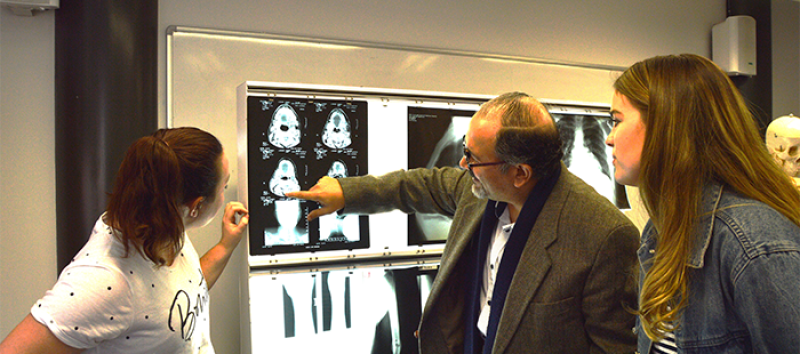
By focusing on students' transition into the program, Joseph deliberately identifies and teaches threshold skills necessary for their progression. He continuously assesses and updates the curriculum to ensure it meets the evolving needs of the industry, thereby equipping students with the knowledge and skills they will need on graduation. Joseph is an active researcher at Unitec, using his research to support his teaching philosophy. He leads many innovative research projects that explore the efficacy of ultrasound and cross-sectional anatomy combined with CT/MRI in anatomy education and these have been integrated into the medical imaging curriculum and presented at international conferences. He uses guided drawing sessions and hands-on use of ultrasound technology in the classroom to provide students with real-time, live imaging of anatomical structures.
At the ANZACA 2019 conference in Perth, Australia, Joseph presented a comparative study highlighting students' readiness for clinical environments. The study compared medical imaging students using traditional regional anatomy approaches (Group I, 2017-2018) with those using a new integrated approach (Group II, 2018-2019). Results showed a significant improvement in Group II, with an average correct identification rate of 89.7% compared to 65.5% in Group I. Dr Aziz found that traditional assessment methods in medical imaging education often relied on written exams and subjective practical evaluations. These are limited as they assess theoretical knowledge and often fail to capture students' practical skills and clinical competencies. Joseph introduced Objective Structured Practical Examinations (OSPE) to better evaluate students' practical skills and knowledge. These are designed to objectively evaluate students' clinical skills and practical anatomical knowledge through a series of standardized stations, each focusing on specific tasks or competencies. Its effectiveness was highlighted in a survey study presented at the ANZACA 2022 conference at Queensland University, Australia. The study showed that OSPE significantly improved students' anatomy learning abilities and better prepared them for clinical settings.
Joseph also introduced Team-Based Learning (TBL) as a pedagogical approach which not only addresses teaching threshold skills but also enhances student engagement, improves performance, and better prepares students for their future careers as radiographers. This approach is particularly effective in medical imaging education, where collaborative skills and critical thinking are crucial. In answer to his students’ questions about what to expect in the exam, he introduced Exam Blueprint, a detailed plan (exam roadmap) that outlines the structure and content of his exam. It aligns exam questions with specific learning objectives and assigns weights to different topics based on their importance and complexity. This approach has significantly improved the quality of exams and enhanced student confidence, preparation, and performance, particularly in areas that traditionally pose challenges. Joseph presented a survey of this method at the 2021 Teaching and Learning Symposium of Unitec and Manukau Institutes of Technology, and it highlighted a significant increase in success rates and high-grade margins. Based on his success, exam blueprint became a trend across medical imaging program being adopted by other staff members.
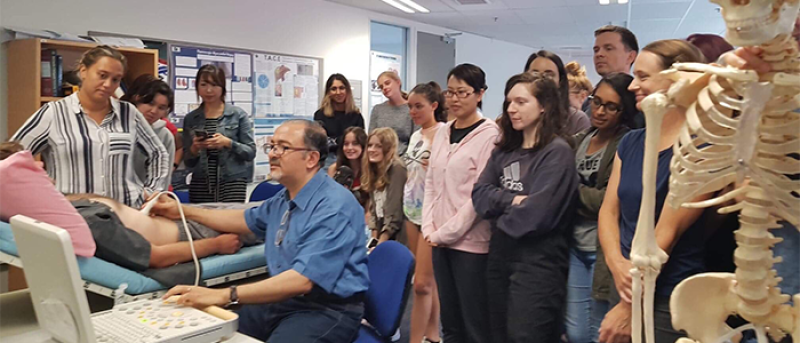 Joseph has successfully overcome numerous challenges and barriers to implement innovative teaching approaches in clinical medicine, one of the biggest being managing resources constraints. To secure funding and support for ultrasound equipment, he partnered with Waitakere DHB, arranging demonstrations and providing training for colleagues. For students struggling with new methods, he offers additional support, such as online tutorials and one-on-one guidance using an interactive ultrasound application. Joseph sees it as crucial to address equity and diversity (Tikanga) as the cornerstone of his teaching practice. He incorporates culturally relevant examples and case studies, ensuring that Māori and Pacific students see their identities reflected in the curriculum, and has also created a simplified manual for anatomical terminology in Māori language.
Joseph has successfully overcome numerous challenges and barriers to implement innovative teaching approaches in clinical medicine, one of the biggest being managing resources constraints. To secure funding and support for ultrasound equipment, he partnered with Waitakere DHB, arranging demonstrations and providing training for colleagues. For students struggling with new methods, he offers additional support, such as online tutorials and one-on-one guidance using an interactive ultrasound application. Joseph sees it as crucial to address equity and diversity (Tikanga) as the cornerstone of his teaching practice. He incorporates culturally relevant examples and case studies, ensuring that Māori and Pacific students see their identities reflected in the curriculum, and has also created a simplified manual for anatomical terminology in Māori language.
Joseph received the Unitec Excellence Award in 2023 and, in early 2024, officially registered as an instructor and member at the Royal College of Surgeons of London. He actively engages with the Industry Advisory Group, such as the NZ Medical Radiation Technologists Board, to ensure that the programme remains aligned with industry needs and expectations.
“I have been using these innovative teaching approaches for more than 5 years. This period has allowed me to refine and adapt the methods based on feedback and the evolving needs of students. To be a successful lecturer, stepdown from the white board, and build a strong relation with your students” (Dr Joseph Aziz).
